Education in the AI Era
Conference speaker bios are below in alphabetical order.
- Bernard Chang
- Morgan Cheatham
- George Daley
- James Diao
- Jeff Drazen
- Maha Farhat
- Susan Farrell
- Holly Gilmer
- Shivangi Goel
- Isaac Kohane
- Arjun Manrai
- Furman McDonald
- Ethan Mollick
- Courtney Morales Hofmann
- Carla Pugh
- Eileen Reynolds
- Adam Rodman
- Peter Szolovits
- Mollie Williams
Bernard S. Chang, MD
Dean for Medical Education
The Daniel D. Federman, MD Professor of Neurology and Medical Education
Harvard Medical School
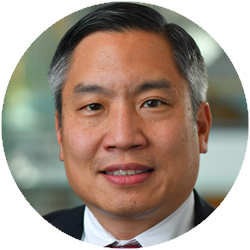 Bernard S. Chang, MD, is the Dean for Medical Education and the Daniel D. Federman, MD Professor of Neurology and Medical Education at Harvard Medical School.
Bernard S. Chang, MD, is the Dean for Medical Education and the Daniel D. Federman, MD Professor of Neurology and Medical Education at Harvard Medical School.
Dr. Chang has had extensive experience as a curricular leader and an advisory dean at HMS. In his clinical practice, he cares for patients with seizure disorders and interprets electroencephalography (EEG) recordings as an attending neurologist at Beth Israel Deaconess Medical Center. His NIH-funded research has centered on the study of developmental brain disorders associated with epilepsy and learning difficulties.
Dr. Chang graduated from Harvard College and the New York University School of Medicine and received a Master of Medical Sciences degree from HMS in clinical investigation. His residency and fellowship were completed in the Harvard training programs at Beth Israel Deaconess Medical Center and Boston Children’s Hospital.
Morgan Cheatham
Vice President, Bessemer Venture Partners
MD Student, Brown University
 Morgan Cheatham is a Vice President with Bessemer Venture Partners where he leads healthcare and life sciences investments from seed to growth stages. He focuses across the value chain spanning software, therapeutics, services, and diagnostics, to improve patient care from bench to bedside and specializes in applications of computation in biomedicine.
Morgan Cheatham is a Vice President with Bessemer Venture Partners where he leads healthcare and life sciences investments from seed to growth stages. He focuses across the value chain spanning software, therapeutics, services, and diagnostics, to improve patient care from bench to bedside and specializes in applications of computation in biomedicine.
Select investments in his portfolio include Abridge, Hinge Health, Headspace Health (fka Ginger), Subtle Medical, Turquoise Health, Productboard, Plenful, Groups Recover Together, Ansible Health, and FOLX Health, where he serves on the board and previously served as Interim CEO. He was awarded Forbes 30U30 for Venture Capital and the National Venture Capital Association Rising Star Award in 2023.
Morgan is pursuing medical training at The Warren Alpert Medical School of Brown University with a research focus in bioinformatics. His research collaborations have included the Shah Lab at the Stanford Institute for Human-Centered AI, where he is investigating the clinical utility and validation of LLMs, and more recently, the Zitnik Lab at the Harvard Department of Biomedical Informatics, where he is interested in investigating questions pertaining to multi-modal phenotyping and therapeutic response prediction. He is also a member of the NEJM AI Editorial Team. He earned his bachelor of science from Brown University.
George Daley, MD, PhD
Dean of the Faculty of Medicine
Caroline Shields Walker Professor of Medicine
Harvard Medical School
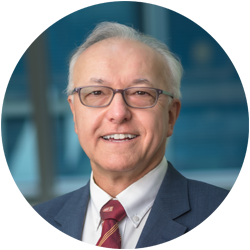 George Q. Daley, MD, PhD, is the dean of Harvard Medical School and the Caroline Shields Walker Professor of Medicine. A physician-scientist and an authority on stem cell science and cancer biology, his discoveries have twice been cited in Science magazine’s Top 10 Breakthroughs of the Year. He has co-authored international guidelines for the conduct and clinical translation of stem cell research and regenerative medicine and for ethical oversight of emerging biotechnologies. Daley’s priorities as dean of HMS include fostering innovative biomedical, computational and health care policy research, building a pipeline of novel therapeutics founded on basic science, nurturing the next generation of physician-scientists and advancing diversity in science, technology, engineering and medicine. Daley earned his AB and MD degrees from Harvard and a PhD in biology from MIT, and has worked as a trainee, fellow and staff physician at several HMS‐affiliated hospitals.
George Q. Daley, MD, PhD, is the dean of Harvard Medical School and the Caroline Shields Walker Professor of Medicine. A physician-scientist and an authority on stem cell science and cancer biology, his discoveries have twice been cited in Science magazine’s Top 10 Breakthroughs of the Year. He has co-authored international guidelines for the conduct and clinical translation of stem cell research and regenerative medicine and for ethical oversight of emerging biotechnologies. Daley’s priorities as dean of HMS include fostering innovative biomedical, computational and health care policy research, building a pipeline of novel therapeutics founded on basic science, nurturing the next generation of physician-scientists and advancing diversity in science, technology, engineering and medicine. Daley earned his AB and MD degrees from Harvard and a PhD in biology from MIT, and has worked as a trainee, fellow and staff physician at several HMS‐affiliated hospitals.
James Diao, MD
Internal Medicine Resident, Brigham and Women's Hospital
Berkowitz Family Living Laboratory Postdoctoral Research Fellow, Harvard Medical School
 James Diao is an internal medicine resident at Brigham and Women's Hospital and the Harvard Medical School Department of Biomedical Informatics. His research applies computational and statistical tools across clinical epidemiology, machine learning, and image analysis, with first-author articles in NEJM, JAMA, and Nature Communications. During two years in industry, he developed algorithms for molecular predictions from cancer pathology images at PathAI and investigated watch-based measures of cardiovascular fitness at Apple. James graduated from the Harvard-MIT Program in Health Sciences and Technology, where he was a PD Soros Fellow, Forbes Under 30 Honoree, and the 22nd person to graduate with highest honors (summa cum laude) from Harvard Medical School. James also graduated from the University of Cambridge as a Churchill Scholar in Science Policy and from Yale College with degrees in Statistics and Biochemistry.
James Diao is an internal medicine resident at Brigham and Women's Hospital and the Harvard Medical School Department of Biomedical Informatics. His research applies computational and statistical tools across clinical epidemiology, machine learning, and image analysis, with first-author articles in NEJM, JAMA, and Nature Communications. During two years in industry, he developed algorithms for molecular predictions from cancer pathology images at PathAI and investigated watch-based measures of cardiovascular fitness at Apple. James graduated from the Harvard-MIT Program in Health Sciences and Technology, where he was a PD Soros Fellow, Forbes Under 30 Honoree, and the 22nd person to graduate with highest honors (summa cum laude) from Harvard Medical School. James also graduated from the University of Cambridge as a Churchill Scholar in Science Policy and from Yale College with degrees in Statistics and Biochemistry.
Jeffrey M. Drazen, MD
Group Editor, NEJM Group
Senior Physician, Brigham & Women's Hospital
Professor of Medicine, Harvard Medical School
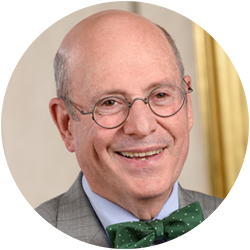 Raised in Clayton, Missouri, Dr. Drazen earned an SB degree in applied physics from Tufts University in 1968 and an MD degree from Harvard Medical School in 1972. He currently is a senior physician at the Brigham and Women’s Hospital, the Distinguished Parker B. Francis Professor of Medicine at Harvard Medical School, and professor of physiology at the Harvard School of Public Health. He is the recipient of honorary degrees from the University of Ferrara, the University of Athens, the University of Modena and the University of Paris-Sud.
Raised in Clayton, Missouri, Dr. Drazen earned an SB degree in applied physics from Tufts University in 1968 and an MD degree from Harvard Medical School in 1972. He currently is a senior physician at the Brigham and Women’s Hospital, the Distinguished Parker B. Francis Professor of Medicine at Harvard Medical School, and professor of physiology at the Harvard School of Public Health. He is the recipient of honorary degrees from the University of Ferrara, the University of Athens, the University of Modena and the University of Paris-Sud.
An active researcher in the field of pulmonary medicine, Dr. Drazen defined the role of novel endogenous chemical agents in asthma, leading to four licensed pharmaceuticals for asthma, now used by tens of millions of people worldwide.
He has published over 600 articles, mostly research and scientific review articles; he has edited 12 books, including seven editions of Goldman-Cecil Medicine and two of Asthma and COPD.
From 2000 to 2019, Dr. Drazen was editor-in-chief of the New England Journal of Medicine (NEJM). During his tenure, the Journal published key articles on infectious disease, cancer, heart disease and lung disease. He now serves as NEJM Group editor.
Maha Farhat, MD, MSc
Gilbert Omenn Associate Professor of Biomedical Informatics; Associate Director, Bioinformatics and Integrative Genomics (BIG) PhD Track, Harvard Medical School
Associate Physician, Pulmonary & Critical Care Division, Massachusetts General Hospital
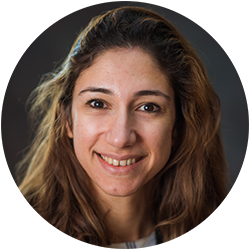 Maha Farhat is a physician scientist and completed her training at the McGill University Faculty of Medicine (2005), Massachusetts General Hospital (2012) and the Harvard Chan School of Public Health (2015). Dr. Farhat's research focuses on the development and application of methods for associating genotype and phenotype in infectious disease pathogens, with a strong emphasis on translation to better diagnostics and surveillance in resource-poor settings. To date, Farhat's work has focused on the pathogen Mycobacterium tuberculosis and spans the spectrum from computational analysis to field studies. She is PI and Co-Investigator on several projects funded by NIH including the NIAID and the BD2K initiative.
Maha Farhat is a physician scientist and completed her training at the McGill University Faculty of Medicine (2005), Massachusetts General Hospital (2012) and the Harvard Chan School of Public Health (2015). Dr. Farhat's research focuses on the development and application of methods for associating genotype and phenotype in infectious disease pathogens, with a strong emphasis on translation to better diagnostics and surveillance in resource-poor settings. To date, Farhat's work has focused on the pathogen Mycobacterium tuberculosis and spans the spectrum from computational analysis to field studies. She is PI and Co-Investigator on several projects funded by NIH including the NIAID and the BD2K initiative.
Susan E. Farrell, MD, EdM
Associate Dean for Assessment and Evaluation
Associate Professor, Emergency Medicine
Harvard Medical School
 Susan E. Farrell, MD, EdM, is the Associate Dean for Assessment and Evaluation at Harvard Medical School.
Susan E. Farrell, MD, EdM, is the Associate Dean for Assessment and Evaluation at Harvard Medical School.
Dr. Farrell graduated from Syracuse University with a BS in engineering cum laude, and Tufts University School of Medicine. Her clinical training was in emergency medicine and medical toxicology, both at The Medical College of Pennsylvania. She completed her master’s in education at the Harvard Graduate School of Education, with a focus on assessment and evaluation methods.
Dr. Farrell has worked in medical education at Harvard Medical School (HMS) since 1998, is the Director of the HMS OSCE Program, and co-leads interprofessional education. She co-directs the Harvard Macy-affiliated 3-day program for post-graduate trainees who aspire to clinician educator careers. She is also actively engaged in certification efforts at the National Board of Medical Examiners and a Director of the Board of the American Board of Emergency Medicine. Her international health professions education work has included programs in New Zealand, Germany, Japan, Singapore, India, and Spain.
Dr. Farrell’s interests are in curriculum development, methods for assessing clinical skills and program evaluation, and interprofessional faculty development related to clinical teaching, assessment skills, teaming, and leadership.
Holly S. Gilmer, MD
Pediatric Neurosurgeon, Michigan Head & Spine Institute
Division Chief, Pediatric Neurosurgery, Ascension St. John Hospital
Chair, Michigan Board of Medicine
 Dr. Holly S. Gilmer graduated cum laude from Harvard University and received her medical degree from the University of Michigan. She then completed residency in neurosurgery at the University of California, Davis Medical Center, followed by fellowships in peripheral nerve surgery at Louisiana State University Medical Center and pediatric neurosurgery at Children’s Hospital of Michigan/Detroit Medical Center. She is board-certified by the American Board of Neurological Surgery and the American Board of Pediatric Neurological Surgery. Dr. Gilmer’s research and clinical specialties include Chiari malformations, dysraphism, hydrocephalus, neuro-oncology, peripheral nerve surgery, and craniofacial reconstruction. She has given over 90 lectures nationally and internationally, and is a regular reviewer for Neurosurgery, Operative Neurosurgery, World Neurosurgery, Child’s Nervous System, and the Journal of the National Medical Association.
Dr. Holly S. Gilmer graduated cum laude from Harvard University and received her medical degree from the University of Michigan. She then completed residency in neurosurgery at the University of California, Davis Medical Center, followed by fellowships in peripheral nerve surgery at Louisiana State University Medical Center and pediatric neurosurgery at Children’s Hospital of Michigan/Detroit Medical Center. She is board-certified by the American Board of Neurological Surgery and the American Board of Pediatric Neurological Surgery. Dr. Gilmer’s research and clinical specialties include Chiari malformations, dysraphism, hydrocephalus, neuro-oncology, peripheral nerve surgery, and craniofacial reconstruction. She has given over 90 lectures nationally and internationally, and is a regular reviewer for Neurosurgery, Operative Neurosurgery, World Neurosurgery, Child’s Nervous System, and the Journal of the National Medical Association.
Dr. Gilmer is a past Director of the Board of the American Association of Neurological Surgeons. She has served on the Executive Committees of the Congress of Neurological Surgeons, AANS/CNS Joint Section on Spine and Peripheral Nerve, and the Council of State Neurosurgical Societies, the Board of Directors of the Wayne County Medical Society, and has been Vice-Chair of the CNS Education Committee. She is past President of Women in Neurosurgery, the Peripheral Nerve Task Force, and the Michigan Association of Neurological Surgeons. She was appointed by Governor Gretchen Whitmer to the Michigan State Board of Medicine in 2019, and was elected Chair of the Board in 2023. She also currently serves on the Scientific and Advisory Board of the Bobby Jones Chiari and Syringomyelia Foundation. She was formerly Chief of Pediatric Neurosurgery at Beaumont, Royal Oak, and Associate Professor of Neurosurgery at Oakland University School of Medicine. She still gives the annual lecture on Cerebrospinal Fluid Anatomy and Physiology to the first year medical students at OU every year, and enjoys talking to medical students about careers in neurosurgery.
Shivangi Goel, MD, MBA
Internal Medicine Resident, Columbia – NewYork-Presbyterian Hospital
 Dr. Shivangi Goel is a resident physician in Internal Medicine at Columbia – NewYork-Presbyterian Hospital, having earned her MD from Harvard Medical School, MBA from Harvard Business School and Bachelor's from MIT with a focus on biomechanical engineering and political science. Throughout her professional journey, Shivangi has contributed to research and development of medical technologies, initially focusing on hardware solutions before transitioning to AI-driven technologies. Her academic research focused on evaluation of surgical devices utilized in cardiothoracic surgery and gastroenterology and she built technologies for underserved populations, including prosthetics and wearables for chronic disease management. She was a Senior Product Manager leading clinical product strategy for AI solutions to improve gastroenterology care at Iterative Health, a MedTech startup, and a consultant at BCG in the MedTech sector. Shivangi is passionate about providing high quality medical care and harnessing technology, especially AI, to advance patient care and outcomes, improve drug development processes and optimize clinical trials, and enhance clinical education.
Dr. Shivangi Goel is a resident physician in Internal Medicine at Columbia – NewYork-Presbyterian Hospital, having earned her MD from Harvard Medical School, MBA from Harvard Business School and Bachelor's from MIT with a focus on biomechanical engineering and political science. Throughout her professional journey, Shivangi has contributed to research and development of medical technologies, initially focusing on hardware solutions before transitioning to AI-driven technologies. Her academic research focused on evaluation of surgical devices utilized in cardiothoracic surgery and gastroenterology and she built technologies for underserved populations, including prosthetics and wearables for chronic disease management. She was a Senior Product Manager leading clinical product strategy for AI solutions to improve gastroenterology care at Iterative Health, a MedTech startup, and a consultant at BCG in the MedTech sector. Shivangi is passionate about providing high quality medical care and harnessing technology, especially AI, to advance patient care and outcomes, improve drug development processes and optimize clinical trials, and enhance clinical education.
Isaac Kohane, MD, PhD
Professor & Chair, Biomedical Informatics; and Co-director, AI in Medicine PhD Track, Harvard Medical School
Editor-in-Chief, NEJM AI
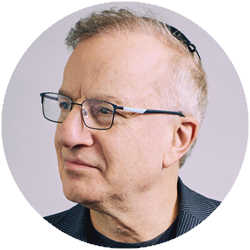 Isaac “Zak” Kohane, MD, PhD, is the inaugural chair of Harvard Medical School’s Department of Biomedical Informatics, whose mission is to develop the methods, tools, and infrastructure required for a new generation of scientists and care providers to move biomedicine rapidly forward by taking advantage of the insight and precision offered by big data. Kohane develops and applies computational techniques to address disease at multiple scales, from whole health care systems to the functional genomics of neurodevelopment. He also has worked on AI applications in medicine since the 1990’s, including automated ventilator control, pediatric growth monitoring, detection of domestic abuse, diagnosing autism from multimodal data and most recently assisting clinicians using whole genome sequence and clinical histories to diagnose rare or unknown disease patients. He is the inaugural Editor-in-Chief of NEJM AI and co-author of a recent book “The AI Revolution in Medicine.” He is a member of the National Academy of Medicine, the American Society for Clinical Investigation and the American College of Medical Informatics.
Isaac “Zak” Kohane, MD, PhD, is the inaugural chair of Harvard Medical School’s Department of Biomedical Informatics, whose mission is to develop the methods, tools, and infrastructure required for a new generation of scientists and care providers to move biomedicine rapidly forward by taking advantage of the insight and precision offered by big data. Kohane develops and applies computational techniques to address disease at multiple scales, from whole health care systems to the functional genomics of neurodevelopment. He also has worked on AI applications in medicine since the 1990’s, including automated ventilator control, pediatric growth monitoring, detection of domestic abuse, diagnosing autism from multimodal data and most recently assisting clinicians using whole genome sequence and clinical histories to diagnose rare or unknown disease patients. He is the inaugural Editor-in-Chief of NEJM AI and co-author of a recent book “The AI Revolution in Medicine.” He is a member of the National Academy of Medicine, the American Society for Clinical Investigation and the American College of Medical Informatics.
Arjun Manrai, PhD
Assistant Professor of Biomedical Informatics, Harvard Medical School
Deputy Editor, NEJM AI
 Arjun (Raj) Manrai, PhD is an Assistant Professor in the Department of Biomedical Informatics at Harvard Medical School, where he leads a research lab that works broadly on applying machine learning and statistical modeling to improve medical decision-making. Raj is also a founding Deputy Editor of NEJM AI, the new artificial intelligence-focused journal from the publishers of the New England Journal of Medicine, and co-host of the NEJM AI Grand Rounds podcast.
Arjun (Raj) Manrai, PhD is an Assistant Professor in the Department of Biomedical Informatics at Harvard Medical School, where he leads a research lab that works broadly on applying machine learning and statistical modeling to improve medical decision-making. Raj is also a founding Deputy Editor of NEJM AI, the new artificial intelligence-focused journal from the publishers of the New England Journal of Medicine, and co-host of the NEJM AI Grand Rounds podcast.
Focus areas for Raj’s research group include the clinical use of genomic data and blood laboratory biomarkers, inherited heart disease and kidney disease, decision making across populations, and reproducibility and safety challenges for medical artificial intelligence. His work has been published in the New England Journal of Medicine and JAMA, presented at the National Academy of Sciences, and featured in the New York Times, Wall Street Journal, and NPR.
Raj is also closely involved in the mentoring of students at Harvard College, having served for over a decade as a Resident Tutor and now member of the Senior Common Room of Leverett House. Students from the lab have won the Rhodes, PD Soros, and other awards to continue their training and research in machine learning and medicine.
Raj took the scenic route to medical AI, earning an AB in Physics from Harvard College followed by a PhD in Bioinformatics and Integrative Genomics from the Harvard-MIT Division of Health Sciences and Technology (HST).
He resides in the Boston area and outside work he can usually be found losing home dance competitions to his 2 young daughters.
Furman S. McDonald, MD, MPH
President and Chief Executive Officer
American Board of Internal Medicine (ABIM) and the ABIM Foundation
 Dr. McDonald, a board-certified internist, is President and Chief Executive Officer of the American Board of Internal Medicine (ABIM) and the ABIM Foundation. Dr. McDonald was formerly ABIM Senior Vice President for Academic and Medical Affairs (2014-2024). Prior to joining ABIM, Dr. McDonald served as Associate Chair of the Department of Medicine and Residency Program Director at Mayo Clinic, Rochester, MN, one of the nation’s largest internal medicine residencies. He served first as a voting member of on the ACGME Review Committee for Internal Medicine (RC-IM), then as ABIM’s Ex Officio member during his time as SVP. His scholarly focus has been to understand the links between GME and patient outcomes having published more than 110 peer reviewed publications. Since joining ABIM, he has continued his role in patient care and GME as an attending physician of the J. Edwin Wood Clinic and faculty of the Pennsylvania Hospital in Philadelphia.
Dr. McDonald, a board-certified internist, is President and Chief Executive Officer of the American Board of Internal Medicine (ABIM) and the ABIM Foundation. Dr. McDonald was formerly ABIM Senior Vice President for Academic and Medical Affairs (2014-2024). Prior to joining ABIM, Dr. McDonald served as Associate Chair of the Department of Medicine and Residency Program Director at Mayo Clinic, Rochester, MN, one of the nation’s largest internal medicine residencies. He served first as a voting member of on the ACGME Review Committee for Internal Medicine (RC-IM), then as ABIM’s Ex Officio member during his time as SVP. His scholarly focus has been to understand the links between GME and patient outcomes having published more than 110 peer reviewed publications. Since joining ABIM, he has continued his role in patient care and GME as an attending physician of the J. Edwin Wood Clinic and faculty of the Pennsylvania Hospital in Philadelphia.
Ethan Mollick, PhD, MBA
Associate Professor and Co-Director of the Generative AI Lab
Wharton School of the University of Pennsylvania
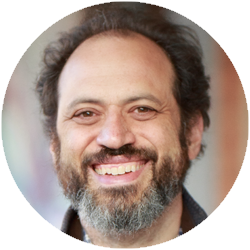
Ethan Mollick is the Ralph J. Roberts Distinguished Faculty Scholar and Associate Professor at the Wharton School of the University of Pennsylvania, where he studies the effects of artificial intelligence on work, entrepreneurship, and education. His academic work has been published in top journals and is highly cited among management researchers. His book on AI, "Co-Intelligence," is a New York Times bestseller, and has been named one of the best books of 2024 so far by Amazon and The Financial Times. His popular blog on AI, One Useful Thing, has nearly 200,000 subscribers.
In addition to his research and teaching, Ethan is the Co-Director of the Generative AI Lab at Wharton, which builds prototypes and conducts research to discover how AI can help humans thrive while mitigating risks. Prior to his time in academia, Ethan co-founded a startup company, and he advises numerous organizations.
Mollick received his PhD and MBA from MIT’s Sloan School of Management and his bachelor’s degree from Harvard University.
Courtney Morales Hofmann, MBA
Mother and Entrepreneur
CEO, MCM Staffing
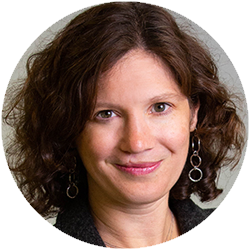 Courtney Morales Hofmann is a married mother of two intelligent, active, and medically complex children. With her husband, they manage 3 rare diseases and multiple chronic diseases. Unwilling to wait any longer for answers, Courtney turned to AI in June 2023 to solve for her son’s pain. It led to a Today.com article that trended #1 on Apple News, Flipboard, and Today Show for several days.
Courtney Morales Hofmann is a married mother of two intelligent, active, and medically complex children. With her husband, they manage 3 rare diseases and multiple chronic diseases. Unwilling to wait any longer for answers, Courtney turned to AI in June 2023 to solve for her son’s pain. It led to a Today.com article that trended #1 on Apple News, Flipboard, and Today Show for several days.
In her professional life, Courtney is the CEO of MCM Staffing and ROBAL Tech, LLC in Michigan. Courtney has a BS and an MBA from the University of Michigan.
Carla Pugh, MD, PhD, FACS
Thomas Krummel Professor of Surgery, Stanford University School of Medicine
Director, the Technology Enabled Clinical Improvement (T.E.C.I.) Center
Presidential Fellow, The Joint Commission
 Carla Pugh, MD, PhD, FACS is the Thomas Krummel Professor of Surgery at Stanford University School of Medicine and Director of the Technology Enabled Clinical Improvement (T.E.C.I.) Center. Her clinical area of expertise is Acute Care Surgery and her research involves the use of simulation, advanced engineering technologies, and artificial intelligence to develop new approaches for assessing and defining mastery in clinical procedural skills. Dr. Pugh is considered to be a leading, international expert on the use of sensors and motion tracking technologies for clinical performance measurement.
Carla Pugh, MD, PhD, FACS is the Thomas Krummel Professor of Surgery at Stanford University School of Medicine and Director of the Technology Enabled Clinical Improvement (T.E.C.I.) Center. Her clinical area of expertise is Acute Care Surgery and her research involves the use of simulation, advanced engineering technologies, and artificial intelligence to develop new approaches for assessing and defining mastery in clinical procedural skills. Dr. Pugh is considered to be a leading, international expert on the use of sensors and motion tracking technologies for clinical performance measurement.
Dr. Pugh obtained her undergraduate degree in Neurobiology at U.C. Berkeley and her medical degree at Howard University School of Medicine. Upon completion of her surgical training at Howard University Hospital, she attended Stanford University to obtain her PhD in Education. Her graduate studies have given her a unique vision and the empirical skills necessary to forge a new and innovative path in using technology and metrics to bridge the gap between process and outcomes. Her goal is to forge a new path towards applied quality metrics in healthcare and to change the face of medical and surgical education through data analytics, data visualization and performance feedback.
Dr. Pugh holds multiple patents on the use of sensor and data acquisition technology to measure and characterize hands-on clinical skills. Currently, over two hundred medical and nursing schools are using one of her sensor-enabled training tools for their students and trainees. She is the Principal Investigator on eight active grants, including a National Institute of Health (NIH) R01 Grant, “Quantifying the Metrics of Surgical Mastery: An Exploration in Data Science,” and a Scoliosis Research Society (SRS) award, “Leveraging Embedded Haptic Sensor Technology for Force Vector Mapping in Orthoses for Adolescent Idiopathic Scoliosis.” Most recently, she was awarded a Wellcome LEAP SAVE (Surgery: Assess/Validate/Expand) contract for her proposal titled, “Advanced Quantification and Acquisition of Surgical Skills Using the Wearable Sensing System.” Throughout her career, she has been awarded over 50 grants garnering over $30 million in funding from government agencies, trusts and foundations, and educational institutions.
Eileen Reynolds, MD, MACP
Chief of General Medicine, Beth Israel Deaconess Medical Center
Associate Professor of Medicine, Harvard Medical School
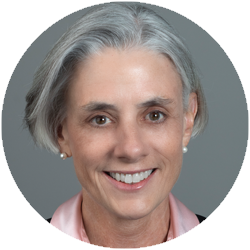 Eileen Reynolds, MD MACP is Chief of General Medicine at Beth Israel Deaconess Medical Center and Associate Professor of Medicine at Harvard Medical School. As Chief she directs all activities in primary care, hospital medicine, and palliative care; she is the founder and leader of the Linde Family Institute for Primary Care Leadership. She edits Beyond the Guidelines, a recurring feature in the Annals of Internal Medicine.
Eileen Reynolds, MD MACP is Chief of General Medicine at Beth Israel Deaconess Medical Center and Associate Professor of Medicine at Harvard Medical School. As Chief she directs all activities in primary care, hospital medicine, and palliative care; she is the founder and leader of the Linde Family Institute for Primary Care Leadership. She edits Beyond the Guidelines, a recurring feature in the Annals of Internal Medicine.
Dr. Reynolds graduated from Harvard College, received her medical degree from HMS, and completed residency training at the University of California, San Francisco. She has won teaching awards as a faculty member at UCSF, the Hospital of the University of Pennsylvania, and HMS, and the ACGME's Parker Palmer Courage to Teach Award. She has served as President of the Society of General Internal Medicine.
Dr. Reynolds and her husband serve as the Faculty Deans of Leverett House, one of Harvard College’s 12 residential houses.
Adam Rodman, MD, MPH
General Internist, Beth Israel Deaconess Medical Center
Assistant Professor, Harvard Medical School
 Adam Rodman, MD, MPH is a general internist and medical educator at Beth Israel Deaconess Medical Center and an assistant professor at Harvard Medical School. His research focuses on medical education and the integration of digital technologies, as well as clinical reasoning and human-computer interaction, especially with artificial intelligence technologies. He is also a historian and author, focusing on the history of medical epistemology, diagnosis, and clinical decision support. His first book is entitled "Short Cuts: Medicine," and he is the host of the American College of Physicians podcast Bedside Rounds.
Adam Rodman, MD, MPH is a general internist and medical educator at Beth Israel Deaconess Medical Center and an assistant professor at Harvard Medical School. His research focuses on medical education and the integration of digital technologies, as well as clinical reasoning and human-computer interaction, especially with artificial intelligence technologies. He is also a historian and author, focusing on the history of medical epistemology, diagnosis, and clinical decision support. His first book is entitled "Short Cuts: Medicine," and he is the host of the American College of Physicians podcast Bedside Rounds.
Adam completed his residency in internal medicine at Oregon Health and Science University in Portland, OR, and his fellowship in global health at Beth Israel Deaconess Medical Center while practicing in Molepolole, Botswana. He lives in Boston with his wife and two young sons.
Peter Szolovits, PhD
Professor of Computer Science and Engineering, Massachusetts Institute of Technology (MIT)
Professor of Health Sciences and Technology, Harvard/MIT
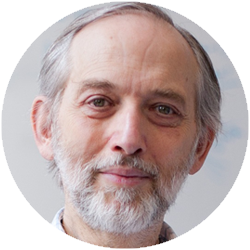 Peter Szolovits is Professor of Computer Science and Engineering in the MIT Department of Electrical Engineering and Computer Science (EECS) for fifty years and Professor of Health Sciences and Technology in the Harvard/MIT HST program. His research and teaching center on the application of AI methods to problems of medical decision making, natural language processing to extract meaningful data from clinical narratives to support translational medicine, the design of life-long information systems for health care institutions and patients, knowledge representation, and machine learning. He received his bachelor's degree in physics and his PhD in information science, both from Caltech. Prof. Szolovits was elected to the National Academy of Medicine and to Fellowships in the American Association for Artificial Intelligence, the American College of Medical Informatics, the American Institute for Medical and Biological Engineering, and the International Academy of Health Sciences Informatics. He has supervised 43 doctoral and 92 master’s theses.
Peter Szolovits is Professor of Computer Science and Engineering in the MIT Department of Electrical Engineering and Computer Science (EECS) for fifty years and Professor of Health Sciences and Technology in the Harvard/MIT HST program. His research and teaching center on the application of AI methods to problems of medical decision making, natural language processing to extract meaningful data from clinical narratives to support translational medicine, the design of life-long information systems for health care institutions and patients, knowledge representation, and machine learning. He received his bachelor's degree in physics and his PhD in information science, both from Caltech. Prof. Szolovits was elected to the National Academy of Medicine and to Fellowships in the American Association for Artificial Intelligence, the American College of Medical Informatics, the American Institute for Medical and Biological Engineering, and the International Academy of Health Sciences Informatics. He has supervised 43 doctoral and 92 master’s theses.
Mollie Williams, DrPH
Executive Director, The Family Van and Mobile Health Map
Lecturer in Global Health and Social Medicine, Harvard Medical School
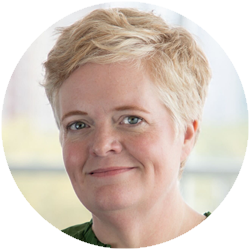 Mollie is a dedicated public health professional who has devoted her career to promoting access to care and advancing health equity. She currently serves as the Executive Director of The Family Van and Mobile Health Map, where she draws upon her extensive experience to provide vital healthcare services to underserved communities in Boston and beyond. In addition to her leadership roles, Mollie is also a passionate educator and researcher, serving as a Lecturer in Global Health and Social Medicine at Harvard Medical School. She has co-authored several publications, including the fifth edition of Health Program Planning and Evaluation. Mollie holds an MPH from the University of Michigan Ann Arbor and a DrPH in Health Policy and Management from the University of North Carolina at Chapel Hill.
Mollie is a dedicated public health professional who has devoted her career to promoting access to care and advancing health equity. She currently serves as the Executive Director of The Family Van and Mobile Health Map, where she draws upon her extensive experience to provide vital healthcare services to underserved communities in Boston and beyond. In addition to her leadership roles, Mollie is also a passionate educator and researcher, serving as a Lecturer in Global Health and Social Medicine at Harvard Medical School. She has co-authored several publications, including the fifth edition of Health Program Planning and Evaluation. Mollie holds an MPH from the University of Michigan Ann Arbor and a DrPH in Health Policy and Management from the University of North Carolina at Chapel Hill.
The conference is sponsored by Merck and Takeda.


